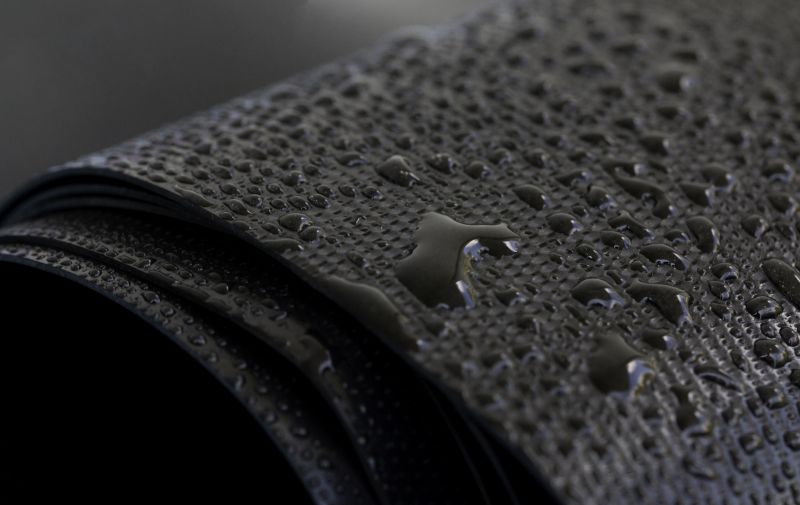Top Waterproofing Products for Effective Moisture Protection
Discover the leading waterproofing solutions designed to safeguard structures from water damage and ensure durability.
 Waterproofing products are essential for protecting structures from water intrusion, which can lead to damage, mold growth, and deterioration over time. These products are used in a variety of applications, including basements, roofs, foundations, and walls. Selecting the right waterproofing solutions depends on factors such as the type of surface, the level of exposure to water, and the specific needs of the project. Proper application and maintenance of waterproofing materials can significantly extend the lifespan of buildings and prevent costly repairs.
Waterproofing products are essential for protecting structures from water intrusion, which can lead to damage, mold growth, and deterioration over time. These products are used in a variety of applications, including basements, roofs, foundations, and walls. Selecting the right waterproofing solutions depends on factors such as the type of surface, the level of exposure to water, and the specific needs of the project. Proper application and maintenance of waterproofing materials can significantly extend the lifespan of buildings and prevent costly repairs.
Top Overall Option
Versatile Liquid Waterproofing Membrane
A flexible and seamless liquid membrane that adheres well to various surfaces, providing a durable barrier against water ingress. Suitable for both interior and exterior applications, it is easy to apply with brush, roller, or spray, making it a popular choice for diverse waterproofing needs.
Types of Products For Waterproofings
Liquid Waterproofing Membranes
Flexible coatings that form seamless barriers over surfaces, ideal for roofs, basements, and decks.
Bituminous Coatings
Asphalt-based coatings offering waterproof protection for foundations and roofing applications.
Rubberized Membranes
Durable rubber sheets or rolls used for basement walls and roofing systems.
Polyurethane Sealants
High-performance sealants for filling cracks, joints, and gaps against water intrusion.
Cementitious Waterproof Coatings
Waterproof plaster-like coatings suitable for masonry and concrete surfaces.
Liquid Elastomeric Coatings
Stretchable coatings that accommodate surface movement while providing waterproof protection.
Self-Adhesive Waterproofing Sheets
Peel-and-stick membranes used for foundation and roof waterproofing.
Spray-On Waterproof Coatings
Sprayed formulations that create a waterproof barrier on various surfaces quickly.
Asphalt Emulsions
Water-based asphalt products used for damp-proofing and waterproofing foundations.
Crack Fill Sealants
Specialized products designed to fill and seal cracks in concrete and masonry.
Waterproofing Paints
Paints with waterproofing properties suitable for walls and ceilings.
Hydrophobic Sealants
Sealants that repel water and prevent absorption into porous surfaces.
Epoxy Waterproof Coatings
High-strength coatings used in areas requiring chemical and water resistance.
Polymer Modified Coatings
Enhanced coatings with added polymers for increased flexibility and adhesion.
Drainage Mat Systems
Materials designed to facilitate water drainage away from foundations and walls.
Waterproofing Tapes
Flexible tapes used to reinforce joints and seams in waterproofing systems.
Waterproofing Collars
Specialized collars to seal around pipes and penetrations in waterproofed surfaces.
Popular Choices
Widely used for their ease of application and seamless coverage, suitable for various surfaces.
Commonly selected for foundational protection and roofing due to their durability.
Favored for their flexibility and long-lasting performance in basement and roof projects.
Popular for sealing cracks and joints, providing reliable water resistance.
Convenient for quick installation on foundations and flat roofs.
Chosen for rapid application and ability to conform to complex surfaces.
Essential for maintaining the integrity of concrete and masonry structures.
Easy-to-apply options for interior wall protection against moisture.
Effective for repelling water on porous surfaces like stone and brick.
Used in areas demanding chemical and water resistance, such as industrial settings.
Offering enhanced flexibility and adhesion for dynamic surfaces.
Popular for directing water away from foundations and below-grade walls.
There is a wide range of waterproofing products available to suit different scenarios. Liquid membranes, sealants, coatings, and membranes are common options, each offering unique advantages. For instance, liquid waterproofing membranes can be applied seamlessly over surfaces, creating a flexible barrier that adheres well to irregular shapes. Sealants are useful for filling cracks and joints, preventing water ingress at vulnerable points. Membranes, often made of rubber or asphalt, provide durable barriers suitable for foundational and roofing applications.
When choosing waterproofing products, it is important to consider the compatibility with existing surfaces, ease of application, drying or curing time, and the level of water resistance provided. Some products are designed for interior use, while others are formulated for exterior applications exposed to harsh weather conditions. Proper surface preparation, such as cleaning and priming, is critical for ensuring optimal adhesion and performance. Regular inspection and maintenance of waterproofed areas can help identify potential issues early and prolong the effectiveness of the waterproofing system.
In the Greenwood, IN area, homeowners and contractors have access to a variety of waterproofing solutions suited for residential and commercial projects. Whether waterproofing a basement, sealing a roof, or protecting a foundation, understanding the range of available products and their appropriate uses can facilitate informed decision-making and successful application.
Key Buying Considerations
- Identify the specific application area (basement, roof, foundation, etc.) to select the appropriate product type.
- Evaluate the water exposure level and choose products rated for the expected conditions.
- Consider the compatibility of the waterproofing material with existing surfaces and materials.
- Assess ease of application, including whether tools or professional installation are required.
- Review drying or curing times to ensure project timelines are met.
- Determine the flexibility of the product, especially for surfaces prone to movement or cracking.
- Check for adhesion properties to ensure the product bonds well to the substrate.
- Look for products with proven durability and resistance to UV, chemicals, and weathering.
- Consider the longevity and maintenance requirements of the waterproofing solution.
- Ensure the product is suitable for interior or exterior use as needed.
- Review safety instructions and handling requirements for the product.
- Compare cost-effectiveness relative to the coverage area and lifespan.
- Verify if the product is compatible with other building materials used in the project.
- Look for additional features such as vapor permeability or breathability if relevant.
- Consult local building codes and regulations to ensure compliance.
